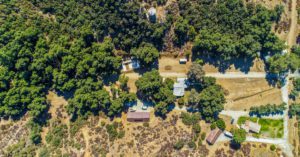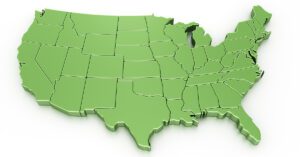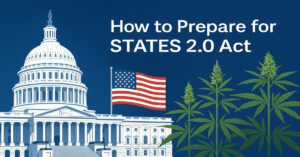Let’s say you own property in a state that has legalized cannabis, and you want to make the most of the green rush. But then you learn that the licensing process is arduous, and that unfortunately cannabis companies have been jumping through costly hoops since inception!
So how else can you increase your property’s attractiveness and maximize its value for a cannabis business?
 Cannabis Property Entitlement starts with a Conditional Use Permit (or CUP). Any property that has some level of cannabis licensing will warrant higher rents and asking prices. Starting the process saves time and mitigates risk for potential buyers, which will make property sales smoother and more likely to complete!
Cannabis Property Entitlement starts with a Conditional Use Permit (or CUP). Any property that has some level of cannabis licensing will warrant higher rents and asking prices. Starting the process saves time and mitigates risk for potential buyers, which will make property sales smoother and more likely to complete!
Understanding how to navigate the requirements of most municipal and state cannabis programs is no simple feat, as Cannabis Compliance Professionals, we work each day on a myriad of requests across the country. From zoning checks, to development agreements, to municipal and state licensing requirements, I’d say we’ve just about seen it all!
For you current or forward-looking cannabis-zoned property owners, we recommend you educate yourself on CUP’s and forge ahead of the other property owners.
Definition of Conditional Use
CUPs allow an owner to ask for exceptions in ways to utilize their property that may be outside of the specific zoning of a district. There is often an oral presentation to the zoning board or city planning commission.
There are innumerable reasons why someone would request a CUP. Most small businesses that operate in residential areas would need a CUP, as do schools and churches. The exact steps to be taken vary from city to city. When an audience is requested to the zoning board, they will explain to the applicant the local process, as well as application cost. It is up to the applicant to present a reason why the leniency or exception should be made.
Many neighborhoods resist having certain corporate or franchise allowances, as they believe it will change the fabric of their community. Property values may be increased or diminished by having certain businesses nearby. Increased noise and traffic is undesirable in a residential area, yet having some conveniences nearby is actually a boon.
What is a Cannabis Conditional Use Permit?
 Cannabis zoning is new territory for these permits. Some CUP’s are more controversial than others, and I think it’s obvious which end of the spectrum cannabis falls. It’s important to gather information from board members, as well as constituents about likely objections.
Cannabis zoning is new territory for these permits. Some CUP’s are more controversial than others, and I think it’s obvious which end of the spectrum cannabis falls. It’s important to gather information from board members, as well as constituents about likely objections.
It is imperative that you craft a thorough and compelling argument for how the flexibility in land use will positively affect the zone as a whole. You have to anticipate grievances and prepare detailed rebuttals well ahead. Having an attorney who specializes in a municipality’s specific zoning practices along with a community’s biases is indispensable, and will greatly increase your chances of permission to use the land.
Zoning is a very nuanced legal area, and you would do well to really understand local temperament when approaching it. If a CUP is granted it is considered permanent as long as you continue to meet the governing body’s conditions. Since the permit stays with the land, renters/buyers can jump right in and gain ownership.
You may find that you feel the conditions are unreasonable or excessively burdensome, or opposition may feel the conditions are too lenient, and that the negative impacts are not being properly considered. There are often ways to counter a decision, which is why the process can often stretch out past expectations.
How will a CUP Increase my Property Value?
The most common request we get from property owners is to help market and sell their property.
 Attracted by news of municipal cannabis zoning ordinances, and nearby properties that have sold for well above their appraised values, owners are flocking to understand how the “green rush” can maximize the value of their property. Now is the golden time, but even if you have navigated the process in one location, it’s still a convoluted path, as no two programs are alike.
Attracted by news of municipal cannabis zoning ordinances, and nearby properties that have sold for well above their appraised values, owners are flocking to understand how the “green rush” can maximize the value of their property. Now is the golden time, but even if you have navigated the process in one location, it’s still a convoluted path, as no two programs are alike.
First, you must have a foundational understanding of how cannabis licensing typically works. For the majority of states with cannabis licensing programs, the application process is broken down into 2 parts: Municipal and State.
While the state initially elects a governing body to create a path and process by which commercial cannabis activities can legally be conducted (based on a state statute), the first step in that process is to obtain local municipality approval.
Municipalities will often have an independent department tasked with issuing and regulating cannabis licensing and operations based on a local ordinance. Since securing and verifying the zoning of a potential cannabis property is required by all municipal and state cannabis licensing programs, this local ordinance becomes a critical first step in the cannabis licensing process.
Ease your Way to Full Licensing with a CUP First
 Identifying a property for cannabis operations will entail substantially more than a basic zoning check. Most state cannabis statues will include minimum setback distances from “sensitive uses”.
Identifying a property for cannabis operations will entail substantially more than a basic zoning check. Most state cannabis statues will include minimum setback distances from “sensitive uses”.
Grade K-12 schools, religious institutions, public parks and drug rehabilitation centers are often included in the sensitive use definitions of state cannabis statutes. It can get VERY complicated.
Municipal ordinances typically mirror the state requirements, sometimes being more restrictive in their minimum setback distances and/or adding additional items to their sensitive uses definition. For most municipal cannabis programs, the process of qualifying a property for cannabis operations is handled by applying for a Conditional Use Permit (CUP).
Much like municipal and state cannabis programs, the requirements and definitions for CUPs can vary greatly. This explanation of a CUP is from the County of Los Angeles:
A Conditional Use Permit (CUP) is required for certain land uses which may need special conditions to ensure compatibility with surrounding land uses. These uses are specified under “Uses Subject to Permits” in the zones or specified in a Community Standards District (CSD). To be approved, a CUP must be consistent with the existing adopted General Plan, including local area and community plans, which reflect the County’s policy regarding land use, and the Los Angeles County Code Title 22 Planning and Zoning.
Major issues involved with the evaluation of CUP requests include consistency with the General Plan; compatibility with surrounding land uses; conditions to ensure compatibility; land suitability and physical constraints; project design; availability of adequate access, public services, and facilities to serve the development; and potential environmental impacts and mitigation measures.
Applying for Cannabis Licensing vs. Conditional Use Permit
The costs, lengthy timeline and unmitigated risks are enough to deter many cannabis-zoned property owners from applying for licensing.
For those looking to take the initial step towards entitlement for their property, a Conditional Use Permit presents a relatively risk-free way of preparing the property for a future cannabis operator. Unlike the municipal and state cannabis operating process, CUP applications do not require background checks and are typically a matter of resolving comments from municipal departments as opposed to the pass/fail nature of cannabis licensing.
CUPs are typically tied to the property, and as such, do not require additional action when the property is sold or leased to a new tenant.
We Can Help You Acquire a CUP / Conditional Use Permit for Cannabis Operations
 The subject of cannabis property entitlement continues to be a hot topic within the current cannabis and real estate markets.
The subject of cannabis property entitlement continues to be a hot topic within the current cannabis and real estate markets.
Conditional Use Permits are required for most municipal cannabis licensing programs. By obtaining a CUP for your property, you’re not only increasing its value, you’re shortening the timeline in which a future cannabis operator can qualify for licensing.
Interested in taking the initial step towards entitling your property? Let’s talk!
Ask Our Compliance Department A Question:





